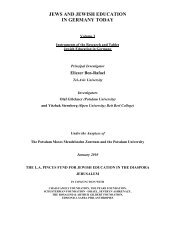jews and jewish education in germany today - The Westbury Group
jews and jewish education in germany today - The Westbury Group
jews and jewish education in germany today - The Westbury Group
Create successful ePaper yourself
Turn your PDF publications into a flip-book with our unique Google optimized e-Paper software.
10. JOHANNES HEIL<br />
June 8, 2009, Heidelberg<br />
● Prof. Heil, what do you consider the current major challenges/difficulties fac<strong>in</strong>g the Jewish Communities<br />
<strong>and</strong> organizations <strong>in</strong> Germany?<br />
As you know the majority of Jewish Communities consist of a Russian speak<strong>in</strong>g majority now, most of them<br />
immigrants from the former Soviet Union who came here dur<strong>in</strong>g the 1990’s. A part of them has a very strong<br />
religious consciousness, but a huge number of them have lost all contact to the Jewish religion <strong>and</strong> tradition<br />
dur<strong>in</strong>g Soviet times. <strong>The</strong> basics have to be imparted to create a European Jewish identity <strong>in</strong> the Community.<br />
It is important to have qualified personnel on the local level <strong>in</strong> order to form stable Jewish Communities, <strong>and</strong><br />
first of all to f<strong>in</strong>d a way how to <strong>in</strong>volve more young Jewish people.<br />
● Do you see generation specific problems or difficulties?<br />
At my visits to the local Jewish Community of Heidelberg, I see that a lot of elderly people<br />
are frequent<strong>in</strong>g the synagogue <strong>and</strong> the events on offer. I also note that the middle age group, let’s say those <strong>in</strong><br />
their 40’s <strong>and</strong> 50’s, are almost not present. <strong>The</strong>re are a lot of reasons for this. Some of them seem really<br />
unable to jo<strong>in</strong> Community events, because they are too busy with f<strong>in</strong>d<strong>in</strong>g jobs, or further vocational tra<strong>in</strong><strong>in</strong>g.<br />
So the crucial question is what about third group, the youth? No doubt, there is a high potential, <strong>and</strong> it is one<br />
of the biggest challenges to create programs that attract the young people <strong>and</strong> motivate them for commitment.<br />
● How would you describe the current relations between German Jewish veterans <strong>and</strong> Russian speak<strong>in</strong>g<br />
immigrants?<br />
Well, history normally does not repeat itself. But what the Jewish Communities are undergo<strong>in</strong>g is just a k<strong>in</strong>d<br />
of repetition. Immediately after World War II a few German Jews came back to their former places of<br />
residence; some had survived there, hav<strong>in</strong>g been hidden. However, a majority <strong>in</strong> the newly founded<br />
Communities were Jewish displaced persons from Eastern Europe. So, what you call the “German veterans”<br />
are these who are try<strong>in</strong>g now to <strong>in</strong>tegrate the recent <strong>in</strong>flux from Eastern Europe, especially from the former<br />
USSR. <strong>The</strong>se veterans had their own immigrant experiences a few decades ago. So there might be<br />
misunderst<strong>and</strong><strong>in</strong>gs, some language or other barriers, but the immigration experience is someth<strong>in</strong>g that many<br />
on both sides have <strong>in</strong> common. I am optimistic <strong>in</strong> this regard, I th<strong>in</strong>k that can also connect.<br />
● Some voices are talk<strong>in</strong>g about a new pluralism of Jewish life <strong>in</strong> Germany. Do you share this view? And if<br />
so, what are the most essential components of this new German Jewish pluralism?<br />
It’s not that easy to answer this question. Yes, I would say, there is Jewish pluralism now <strong>in</strong> Germany at<br />
some places with<strong>in</strong> the E<strong>in</strong>heitsgeme<strong>in</strong>de [United Community], <strong>and</strong> at some places by detached, dist<strong>in</strong>ct<br />
communities <strong>and</strong> <strong>in</strong>stitutions. I th<strong>in</strong>k this is a quite normal process. But it’s hard to predict where it will lead.<br />
<strong>The</strong>re is much variety <strong>in</strong> the about 100 Jewish Communities <strong>in</strong> Germany, cultural differentiations, religious<br />
differentiation, different M<strong>in</strong>yanim, <strong>and</strong> why shouldn’t that be? All congregations have their impacts, it’s a<br />
normal process.<br />
● <strong>The</strong> United Communities have understood themselves as be<strong>in</strong>g more or less Orthodox. Now there are<br />
strong impacts by the Liberals <strong>and</strong> also by the Conservatives/Masorti. Do you see chances for a vibrant<br />
development for all of these congregations?<br />
63 | P a g e



